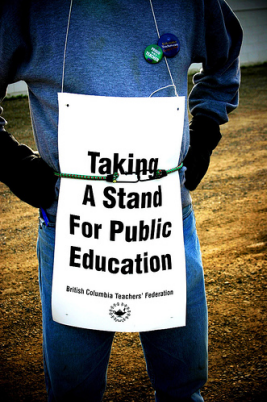By Sasha Moedt (The Cascade) – Email
Date Posted: October 24, 2011
Print Edition: October 19, 2011
 The British Columbia Teacher’s Federation has taken a lot of crap lately. Discussion for the new contract began in the spring with the completion of the last contract term on June 13, and that’s the end of the story as far as government negotiation goes. The BCTF is asking for the reinstatement of funding and staffing levels prior to Bills 27 and 28, among other things. Meanwhile government appears to be using the persuasive, argumentative techniques of a child – covering their ears and singing “we‘ve got nothing to offer!”
The British Columbia Teacher’s Federation has taken a lot of crap lately. Discussion for the new contract began in the spring with the completion of the last contract term on June 13, and that’s the end of the story as far as government negotiation goes. The BCTF is asking for the reinstatement of funding and staffing levels prior to Bills 27 and 28, among other things. Meanwhile government appears to be using the persuasive, argumentative techniques of a child – covering their ears and singing “we‘ve got nothing to offer!”
Bills 27 and 28 stripped the provincial agreement of many working and learning conditions, cutting $275 million in education funding. Most significantly, it restricted BCTF involvement in reducing class sizes and composition. This is an issue that has arisen in the past. The last contract did not address this question, but in April the Supreme Court ruled that the government is not allowed to take away that right; it is essentially an issue involving the regulating of workplace conditions.
While clarification for class sizes isn’t necessary, what is meant by class composition is the number of special education students and students with learning disabilities or behaviour disorders in classes. It can be challenging for a teacher to distribute attention when there are several students who could thrive under guidance but flounder if neglected, and BCTF is attempting to address this. With the Supreme Court ruling, the government is required to change this – yet they take no action. Is the government intending to wait until next spring to correct their mistake, when their time allotted by the Supreme Court is up? BCTF is basically saying let’s put it into the contract now, so we don’t have to renegotiate it.
Salary increase, another contract demand, is a difficult thing to ask for without risking a negative media spin. But B.C. has one of the lowest salaries in the country for teachers. Last contract there was a pay increase for teachers, that being 16 per cent over the five year period. With the rate of inflation being 2.5 per cent each year, the pay increase only works out to 3.5 per cent over that five-year period. For the current contract the government is offering no salary increase. Thus, teachers will once again find their salary falling behind rates of inflation. The government isn’t just offering nothing, they’re offering reductions.
Phase one of the BCTF strike began with the opening of schools. It is actually a very interesting idea. It was made illegal to strike because teaching was ruled an essential service, so teachers found other ways. Teachers continue on with their work, still teaching in classes, but they no longer engage in administrative work. This means no supervision before or after classes, no staff meetings, and no extra-curricular activity. There are no report cards, though teachers still make sure to communicate with parents and collect grades, and there is no official reporting, nor passing on information to administration. Phase one requires teachers not to communicate directly with admin.
Phase one has been going on for a month. There remains our obstinate government at the negotiating table. BCTF might be forced to take further steps. Further administrative services can be withheld; teachers remain voluntarily involved in activities such as coaching, and they could discontinue this. The labour relations board ruled that a two week strike will not affect students in the long term, so the BCTF might engage in a strike.
The types of people who become teachers are clever and compassionate; no teacher gets into the field for the pay. It’s a hard job that requires empathy, charisma and understanding. Teachers care about their pupils and take responsibility for their well-being not only in education but in welfare. Perhaps this is a generalization – but it cannot be denied that a person who enters into the field of teaching does not merely have a passion for their subject: teaching goes so much further than that. Teachers give and give, and when things get taken away they stack the workload higher to fill in the gaps, until they burn out and go on stress leave.
So no administrative work sounds just fine. All that extra-curricular stuff—the reports, the paperwork, the meetings—is what takes teachers away from the students. Now they spend their time in classes, only the necessities, doing only what they’re paid for doing. Teachers care enough about their students to continue the essential task of maintaining the education of students. They aren’t being selfish, and you’d be ridiculous to call them lazy. They are asking for the basic right to be paid for their hours and their workload, which becomes increasingly more strenuous with government cutbacks. But more importantly, the BCTF is trying to make the classroom a better environment for students
If the government calls teachers’ work an essential service, then it should be treated one. The apathetic empty-handedness on the government’s side of the bargaining table is insulting, both to teachers and the students being defended.

